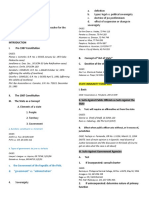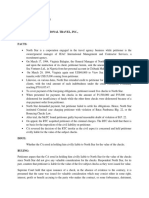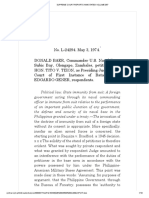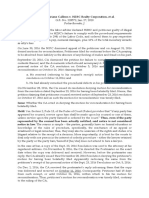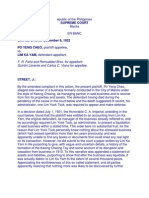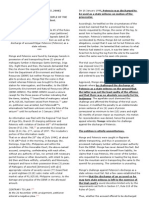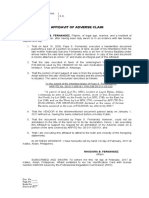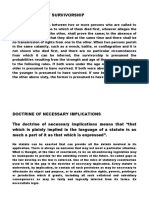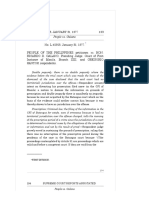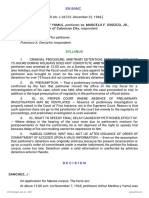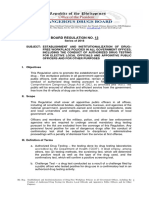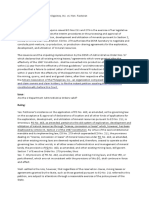Lopes Vs CSC
Lopes Vs CSC
Uploaded by
spidercyeCopyright:
Available Formats
Lopes Vs CSC
Lopes Vs CSC
Uploaded by
spidercyeOriginal Title
Copyright
Available Formats
Share this document
Did you find this document useful?
Is this content inappropriate?
Copyright:
Available Formats
Lopes Vs CSC
Lopes Vs CSC
Uploaded by
spidercyeCopyright:
Available Formats
1. Lopez v.
Civil Service Commission 194 SCRA 269
The Court has defined the parameters within which the power of approval of appointments
shall be exercised by the respondent Commission. In the case of Luego v. Civil Service
Commission, 143 SCRA 327 [1986], the Court ruled that all the Commission is actually
authorized to do is to check if the appointee possesses the qualifications and appropriate
eligibility: "If he does, his appointment is approved; if not it is disapproved." We further ruled
that the Commission has no authority to revoke an appointment simply because it believed
that the private respondent was better qualified for that would have constituted an
encroachment of the discretion vested solely in the appointing authority. The Commission
cannot exceed its power by substituting its will for that of the appointing authority. (Central
Bank v. Civil Service Commission, 171 SCRA 744 [1989]).
The power of appointment exercised after a judicious recommendation made by a placement
Committee of the agency concerned is:
(A)n essentially discretionary power and must be performed by the officer in which it is vested according to
his best lights, the only condition being that the appointee should possess the qualification required by law.
If he does, then the appointment cannot be faulted on the ground that there are others better qualified who
should have been preferred. This is a political question involving considerations of wisdom which onlyu the
appointing authority can decide. (Emphasis supplied; Luego v. Civil Service Commission, supra, at p. 332)
The head of an agency who is the appointing power is the one most knowledgeable to decide
who can best perform the functions of the office. (Ocampo v. Subido, 72 SCRA 433 [1976];
Torres v. Borja, 56 SCRA 47 [1974]; Santiago v. Civil Service Commission, 178 SCRA 733
[1989] He has a wide latitude of choice as to the person to appoint where the law does not
impose rigid conditions. (Reyes v. Abeleda, 22 SCRA 825 [1968]). Section 6, Rep. Act No.
6656 on government reorganization merely provides that the selection or placement should
be done through the creation of a Placement Committee the members of which are
representatives of the head of the agency as well as representatives of the head of the
agency as well as representatives of the employees. The committee's work is
recommendatory and does not fix a stringent formula regarding the mode of choosing from
among the candidates. Thus, the respondents' arguments on the alleged inconsistencies and
non-conformity with Rep. Act No. 6656 in rating the contenders are without merit.
You might also like
- Criminal Law Ateneo 2014Document72 pagesCriminal Law Ateneo 2014bianca75% (8)
- Dinamika Sosial, Politik & Hukum, Chaos & Penyalahgunaan KekuasaanDocument17 pagesDinamika Sosial, Politik & Hukum, Chaos & Penyalahgunaan Kekuasaanabie shadilyNo ratings yet
- LUZVIMINDA CANLAS v. REPUBLICDocument2 pagesLUZVIMINDA CANLAS v. REPUBLICZusmitha Salcedo100% (3)
- Blackmer v. United States, 284 U.S. 421 (1932)Document9 pagesBlackmer v. United States, 284 U.S. 421 (1932)Scribd Government DocsNo ratings yet
- 193 Sarmiento Vs CA, 394 SCRA 315 (2002)Document1 page193 Sarmiento Vs CA, 394 SCRA 315 (2002)Alan GultiaNo ratings yet
- Carmelo vs. RamosDocument1 pageCarmelo vs. RamosAlljun SerenadoNo ratings yet
- 62 Octot Vs YbanezDocument5 pages62 Octot Vs YbanezdavidNo ratings yet
- Mercado v. Dysangco PDFDocument7 pagesMercado v. Dysangco PDFMarion Yves MosonesNo ratings yet
- Associated Bank v. CADocument1 pageAssociated Bank v. CAkim_santos_20No ratings yet
- Administrative Law Belongs To The Field of Public Law. It Embraces AllDocument23 pagesAdministrative Law Belongs To The Field of Public Law. It Embraces AllJeg GonzalesNo ratings yet
- Lee v. Court of Appeals (G.R. No. 90423, September 6, 1991)Document1 pageLee v. Court of Appeals (G.R. No. 90423, September 6, 1991)Migs MarcosNo ratings yet
- (Memoracion) Cases 112-114Document6 pages(Memoracion) Cases 112-114Michael Angelo MemoracionNo ratings yet
- Stronghold Insurance Co v. CuencaDocument2 pagesStronghold Insurance Co v. CuencaJan AquinoNo ratings yet
- Poli Bar QuesDocument5 pagesPoli Bar QuesCLO GENSANNo ratings yet
- Ching vs. Secretary of JusticeDocument3 pagesChing vs. Secretary of JusticeAderose SalazarNo ratings yet
- Property Reviewer - EasementsDocument11 pagesProperty Reviewer - EasementsPamela ParceNo ratings yet
- Delfin Vs InciongDocument1 pageDelfin Vs InciongzzzNo ratings yet
- Protacia vs. Atty. MendozaDocument2 pagesProtacia vs. Atty. MendozaLloyd David P. VicedoNo ratings yet
- Fortis Vs HermanosDocument1 pageFortis Vs HermanosJoanna MandapNo ratings yet
- Doctrine:: Bank of The Philippine Islands v. Reynald Suarez GR NO 167750 - March 15, 2010 - CARPIO, JDocument2 pagesDoctrine:: Bank of The Philippine Islands v. Reynald Suarez GR NO 167750 - March 15, 2010 - CARPIO, JJORLAND MARVIN BUCUNo ratings yet
- PASTOR EDWIN VILLARIN, PACIANO DE VEYRA, SR., and BARTOLOME EVAROLO, SR., vs. ATTY. RESTITUTO SABATE, JR.Document2 pagesPASTOR EDWIN VILLARIN, PACIANO DE VEYRA, SR., and BARTOLOME EVAROLO, SR., vs. ATTY. RESTITUTO SABATE, JR.Jakie CruzNo ratings yet
- Decano V EduDocument2 pagesDecano V EduColee StiflerNo ratings yet
- Emilita Solarte Case DigestDocument2 pagesEmilita Solarte Case DigestMarilou GaralNo ratings yet
- Cayetano vs. MonsodDocument2 pagesCayetano vs. MonsodYohanna J K GarcesNo ratings yet
- People V SantosDocument2 pagesPeople V SantosTherese AmorNo ratings yet
- Ejera Case and Montemayor Case DigestDocument5 pagesEjera Case and Montemayor Case Digestjack FrostNo ratings yet
- Saldana vs. Phil. GuarantyDocument1 pageSaldana vs. Phil. GuarantyKeilah ArguellesNo ratings yet
- Admin Cases CompDocument11 pagesAdmin Cases Compwilfred poliquit alfeche100% (1)
- Real and Personal Defense (Law3)Document3 pagesReal and Personal Defense (Law3)Angelene MangubatNo ratings yet
- Fleischer vs. Botica NolascoDocument4 pagesFleischer vs. Botica NolascoBelle PenalosaNo ratings yet
- Far East Bank vs. Union BankDocument28 pagesFar East Bank vs. Union BankDANICA ECHAGUENo ratings yet
- CDP 40. Part 8 Case No. 26 When There Is NO NegligenceDocument3 pagesCDP 40. Part 8 Case No. 26 When There Is NO NegligencemattNo ratings yet
- Jalosjos Vs COMELECDocument2 pagesJalosjos Vs COMELECGladys BantilanNo ratings yet
- Conflict of Laws Appilicable Laws Laws Governing Contracts (1992)Document11 pagesConflict of Laws Appilicable Laws Laws Governing Contracts (1992)Cecille Therese PedregosaNo ratings yet
- Consti 2 Syllabus SummaryDocument5 pagesConsti 2 Syllabus SummaryJean C. MatiasNo ratings yet
- 70 90 DigestsDocument6 pages70 90 DigestsJulia PoncianoNo ratings yet
- White v. National Bank, 102 U.S. 658 (1881)Document6 pagesWhite v. National Bank, 102 U.S. 658 (1881)Scribd Government DocsNo ratings yet
- Philippine National Bank vs. Intermediate Appellate Court: - First DivisionDocument6 pagesPhilippine National Bank vs. Intermediate Appellate Court: - First DivisionDorky DorkyNo ratings yet
- Banate Vs PCRBDocument19 pagesBanate Vs PCRBSean Asco RumaNo ratings yet
- 77) Navarro and Tamayo V CADocument2 pages77) Navarro and Tamayo V CAStephanie Griar100% (1)
- Publico V VillapandoDocument1 pagePublico V VillapandoajyuNo ratings yet
- Pacific Rehouse Corp. v. CADocument15 pagesPacific Rehouse Corp. v. CADanica Irish RevillaNo ratings yet
- Macalincag Vs ChangDocument2 pagesMacalincag Vs ChangRaymond RoqueNo ratings yet
- Engr. Jose E. Cayanan vs. North Star International Travel, Inc., G.R. No. 172954 FactsDocument2 pagesEngr. Jose E. Cayanan vs. North Star International Travel, Inc., G.R. No. 172954 FactsIyah MipangaNo ratings yet
- Earthquake Drill Evaluation Form 1Document2 pagesEarthquake Drill Evaluation Form 1ibaanNo ratings yet
- SPL Cases 2Document174 pagesSPL Cases 2Minnie chanNo ratings yet
- Goh vs. Bayron (G.R. No. 212584)Document40 pagesGoh vs. Bayron (G.R. No. 212584)Gretel MañalacNo ratings yet
- Baer Vs Tizon, 57 Scra 1, G.R. No. L-24294, May 3, 1974Document19 pagesBaer Vs Tizon, 57 Scra 1, G.R. No. L-24294, May 3, 1974Gi NoNo ratings yet
- Corpo Full CasesDocument105 pagesCorpo Full CasesGGT InteriorsNo ratings yet
- GARMENTS and TEXTILE EXPORT BOARD (GTEB) V. CA PDFDocument4 pagesGARMENTS and TEXTILE EXPORT BOARD (GTEB) V. CA PDFBrian Kelvin PinedaNo ratings yet
- Pascual Sr. V Caniogan CreditDocument2 pagesPascual Sr. V Caniogan CreditRaven Claire MalacaNo ratings yet
- Public Officers - Assigned CasesDocument13 pagesPublic Officers - Assigned CasesFrances Abigail BubanNo ratings yet
- Calleon v. HZSC RealtyDocument1 pageCalleon v. HZSC RealtyljhNo ratings yet
- 09 Po Yeng Cheo Vs Lim Ka YanDocument5 pages09 Po Yeng Cheo Vs Lim Ka YanDonnabelle CadagNo ratings yet
- Monge Vs PeopleDocument2 pagesMonge Vs PeoplejqdomingoNo ratings yet
- Prudential Bank Vs NLRCDocument2 pagesPrudential Bank Vs NLRCErika Mariz CunananNo ratings yet
- De Leon v. Court of AppealsDocument5 pagesDe Leon v. Court of AppealsJM GenobañaNo ratings yet
- Menzon V PetillaDocument4 pagesMenzon V PetillaJed MendozaNo ratings yet
- Republic v. PLDT, 26 Scra 620Document6 pagesRepublic v. PLDT, 26 Scra 620Anonymous 33LIOv6LNo ratings yet
- MARY LOU GETURBOS TORRES - Versus - CORAZON ALMA G. DE LEON G.R. No. 199440Document2 pagesMARY LOU GETURBOS TORRES - Versus - CORAZON ALMA G. DE LEON G.R. No. 199440LawiswisNo ratings yet
- Explain The Implication of The Phrase "Appointment Is An Exercise of Discretion of The Appointing Authority." Provide Jurisprudential BasisDocument1 pageExplain The Implication of The Phrase "Appointment Is An Exercise of Discretion of The Appointing Authority." Provide Jurisprudential BasisdrumNo ratings yet
- Explain The Implication of The Phrase "Appointment Is An Exercise of Discretion of The Appointing Authority." Provide Jurisprudential BasisDocument1 pageExplain The Implication of The Phrase "Appointment Is An Exercise of Discretion of The Appointing Authority." Provide Jurisprudential BasisdrumNo ratings yet
- Eligibility and Qualifications For Public OfficeDocument4 pagesEligibility and Qualifications For Public OfficeMada Diaz AspacioNo ratings yet
- Special Power of Attorney (Process Estate)Document4 pagesSpecial Power of Attorney (Process Estate)spidercyeNo ratings yet
- Authority To Sell - ArcenoDocument2 pagesAuthority To Sell - ArcenospidercyeNo ratings yet
- Special Power of Attorney (Process Ecar Revalidation)Document1 pageSpecial Power of Attorney (Process Ecar Revalidation)spidercyeNo ratings yet
- Special Power of AttorneyDocument242 pagesSpecial Power of AttorneyspidercyeNo ratings yet
- Special Power of Attorney (To File Case) - Templo To FranciscoDocument2 pagesSpecial Power of Attorney (To File Case) - Templo To FranciscospidercyeNo ratings yet
- Special Power of Attorney (To Claim Title)Document1 pageSpecial Power of Attorney (To Claim Title)spidercyeNo ratings yet
- Special Power of Attorney (To Claim DAR)Document1 pageSpecial Power of Attorney (To Claim DAR)spidercyeNo ratings yet
- Special Power of Attorney (To Attend Pre-Trial) - TeodosioDocument1 pageSpecial Power of Attorney (To Attend Pre-Trial) - TeodosiospidercyeNo ratings yet
- Special Power of Attorney (HM Mercado)Document2 pagesSpecial Power of Attorney (HM Mercado)spidercyeNo ratings yet
- Affidavit of Adverse ClaimDocument1 pageAffidavit of Adverse ClaimspidercyeNo ratings yet
- Doctrines in Civil Law IIDocument37 pagesDoctrines in Civil Law IIspidercyeNo ratings yet
- CSC Vs AlfonsoDocument1 pageCSC Vs AlfonsospidercyeNo ratings yet
- Santos Vs YatcoDocument1 pageSantos Vs YatcospidercyeNo ratings yet
- SIGNIFICANCE OF NITI-NYAYA DISTINCTION IN GLOBAL BUSINESS ETHICS - EditedDocument9 pagesSIGNIFICANCE OF NITI-NYAYA DISTINCTION IN GLOBAL BUSINESS ETHICS - EditedHemendra KumarNo ratings yet
- Schedule of Fees in NCLT 1Document4 pagesSchedule of Fees in NCLT 1Lavkesh BhambhaniNo ratings yet
- Montly Accomplishment Report (10-2019) - 2Document6 pagesMontly Accomplishment Report (10-2019) - 2Ed CabreraNo ratings yet
- S.ST Assertion Reason Ques.Document12 pagesS.ST Assertion Reason Ques.Anusha SinghalNo ratings yet
- MayniladDocument2 pagesMayniladClarence ProtacioNo ratings yet
- Model Policy: Body-Worn CamerasDocument3 pagesModel Policy: Body-Worn CamerasrandomlyfickleNo ratings yet
- Chapter 4Document28 pagesChapter 4Neelam AgarwalNo ratings yet
- Doctrine of Delegatus Non Potest DelegareDocument6 pagesDoctrine of Delegatus Non Potest Delegarekhushigupta.kg246No ratings yet
- Letter To Chief WilliamsDocument5 pagesLetter To Chief WilliamsAnn McAdamsNo ratings yet
- People vs. GalanoDocument11 pagesPeople vs. GalanoRodesa AbogadoNo ratings yet
- Changing Intl Political OrderDocument34 pagesChanging Intl Political OrderSagar NagarajNo ratings yet
- Statement of Claim To The Defendant: Sheilade Santos'TDocument16 pagesStatement of Claim To The Defendant: Sheilade Santos'TJosh WingroveNo ratings yet
- Petitioner vs. vs. Respondent Federico Magdangal Francisco A. GarciaDocument4 pagesPetitioner vs. vs. Respondent Federico Magdangal Francisco A. GarciaCinja ShidoujiNo ratings yet
- Law of Mongolia On Trade Marks and Geographical IndicationsDocument14 pagesLaw of Mongolia On Trade Marks and Geographical IndicationsBulgantamir TuvshinjargalNo ratings yet
- 11m-Programme v5-nl 08062021Document6 pages11m-Programme v5-nl 08062021api-286580632No ratings yet
- Companys Consti & Turquand RuleDocument2 pagesCompanys Consti & Turquand RuleUmar Razak0% (1)
- Scholem Schwartzbard, Biography of A Jewish Assassin, Kelly Scott Johnson PHD 2012Document272 pagesScholem Schwartzbard, Biography of A Jewish Assassin, Kelly Scott Johnson PHD 2012Benjamin RosenzweigNo ratings yet
- 2018 Board REGULATION No 13 PDFDocument7 pages2018 Board REGULATION No 13 PDFMaggie Halasan Escobedo BaroNo ratings yet
- A Survey About Cve in Communities (Cve 4020)Document4 pagesA Survey About Cve in Communities (Cve 4020)sema mutataNo ratings yet
- Ch3 Planned Development Extra Ques Ans - 14109057Document5 pagesCh3 Planned Development Extra Ques Ans - 14109057Deepa SinghNo ratings yet
- San Sebastian College Recoletos College of Law Surigao City ExtensionDocument2 pagesSan Sebastian College Recoletos College of Law Surigao City ExtensionLea UnderscoreNo ratings yet
- BCSR2012Document438 pagesBCSR2012Ugyen YoezrNo ratings yet
- History of Labour WelfareDocument28 pagesHistory of Labour Welfarevarshaa001No ratings yet
- Miners Association of The PhilippinesDocument2 pagesMiners Association of The PhilippinesKarla Kanashii100% (1)
- Holmes 082911Document7 pagesHolmes 082911Lisa BlankenshipNo ratings yet
- Quinto vs. COMELEC CaseDocument8 pagesQuinto vs. COMELEC CaseJacqueline Carlotta SydiongcoNo ratings yet
- List of Elected Sarpanches/Panches: Election AuthorityDocument89 pagesList of Elected Sarpanches/Panches: Election AuthorityRinchen GyatsoNo ratings yet


































